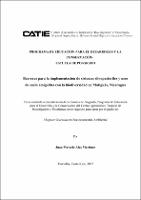Mostrar el registro sencillo del ítem
Barreras para la implementación de sistemas silvopastoriles y usos de suelo amigables con la biodiversidad en Matiguás, Nicaragua
| dc.contributor.advisor | Casanoves, Fernando | es_Es |
| dc.contributor.author | Alas Martínez, Juan M. | |
| dc.date.accessioned | 2014-10-17T06:14:28Z | |
| dc.date.available | 2014-10-17T06:14:28Z | |
| dc.date.issued | 2007 | es_ES |
| dc.identifier | 371269 | es_ES |
| dc.identifier.uri | https://repositorio.catie.ac.cr/handle/11554/516 | |
| dc.description | Tesis (Mag. Sc.) -- CATIE, 2007 | es_ES |
| dc.description.abstract | En muchos estudios realizados en paisajes ganaderos se ha evidenciado la necesidad de realizar prácticas en función del medioambiente. A pesar de esto, los cambios en este sentido han sido pocos, por esta razón es necesario hacer estudios que evidencien porque los finqueros no adoptan prácticas amigables con la biodiversidad. En este trabajo se estudian factores internos y externos que afectan la adopción de Sistemas Silvopastoriles (SSP) y usos de suelo amigables con la biodiversidad. Los resultados del estudio de las instituciones sugieren que la mayoría de estas son ONG trabajan en función de rentabilidad, realizando préstamos a productores medianos y pequeños con fondos gestionados por los que deben pagar intereses, esto los orienta a hacer prestamos de corto plazo, lo que limita las inversiones referidas a conservación por los largos periodos de recuperación de la inversión. In many studies undertaken in pastoral landscapes, the need to realize environmentally friendly practices has become evident. Unfortunately, progress in this area has been slow. As so, it is necessary to undertake studies that document why farmers are not adopting biodiversity-friendly practices. In this project, both internal and external factors were studied that affect the adoption of silvopastoral systeMON (SSP) and biodiversity-friendly land uses. The results the institutional study suggested that the majority of the of the institutions are ONGs, that work in function of profitability, make loans to small and medium producers with funds on which the ONGs must pay interest. This reality forces them to make only short-term loans, which limits inversions to conservation-oriented endeavours that would require longer periods to recover the inversion. | es_ES |
| dc.language.iso | es | es_ES |
| dc.publisher | Centro Agronómico Tropical de Investigación y Enseñanza (CATIE) | es_ES |
| dc.relation.ispartof | Maestría en Socioeconomía Ambiental | |
| dc.subject | SISTEMAS SILVOPASCICOLAS | |
| dc.subject | BIODIVERSIDAD | |
| dc.subject | UTILIZACION DE LA TIERRA | |
| dc.subject | GANADERIA | |
| dc.subject | EXPLOTACIONES AGRARIAS | |
| dc.subject | EXPLOTACION EN PEQUENA ESCALA | |
| dc.subject | EXPLOTACIONES AGRARIAS | |
| dc.subject | CAPITAL | |
| dc.subject | RECURSOS ECONOMICOS | |
| dc.subject | FINANCIAMIENTO | |
| dc.title | Barreras para la implementación de sistemas silvopastoriles y usos de suelo amigables con la biodiversidad en Matiguás, Nicaragua | es_ES |
| dc.title.alternative | Barriers to the implementation of silvopastoral systems and land uses in the area of Matiguás, Nicaragua | es_ES |
| dc.type | Tesis de maestría | es_ES |
| dc.identifier.publication | Turrialba (Costa Rica) | es_ES |
Ficheros en el ítem
Este ítem aparece en la(s) siguiente(s) colección(ones)
-
Tesis [1392]


